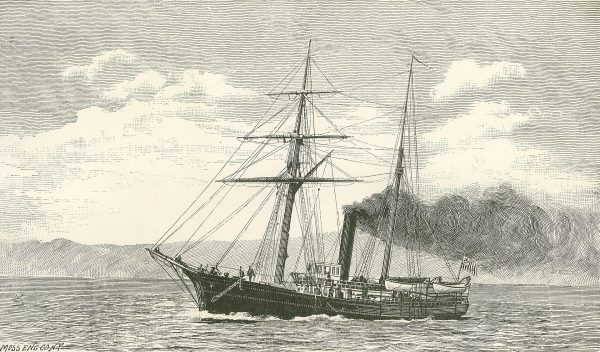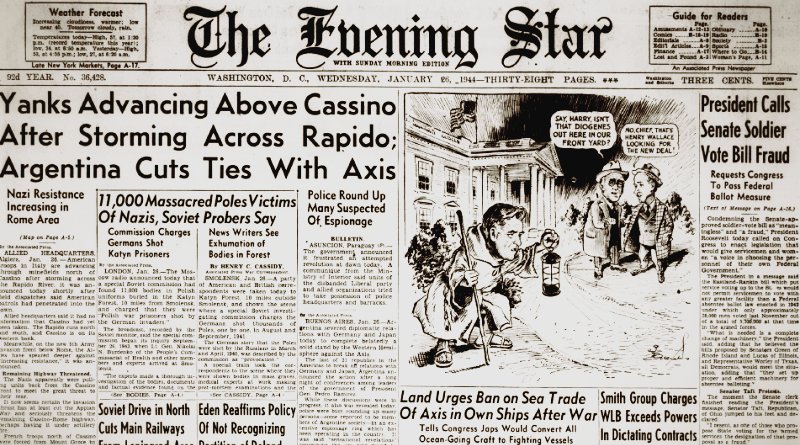World War II Chronicle: January 26, 1944
Click here for TODAY’S NEWSPAPER
Imagine for a minute that you’re Josef Stalin and you ordered the massacre of let’s say around 20,000 Poles a few years ago. Back then you couldn’t have cared less about Western opinion and Germany hadn’t invaded. Fast-forward four years and now the mass graves have been found. You don’t blink an eye at the thought of tens of millions of your own citizens dying, much less Poles. But you need American tanks, trucks, and everything else to drive out the invaders keep your regime intact. So what do you do with this public relations nightmare?
Blame the Germans.
Oh, the Germans found what you did in the Katyn Forest already and tried to alert the world? Easy. That was Nazi propaganda, trying to cover their own evil fascist tracks. Nothing to see here, Comrade Roosevelt. Keep the billions of dollars of military aid coming!
Many people enjoy studying World War II because it was such a clear good-versus-evil fight. Allies like the United States, Britain, Canada, and Australia were clearly on the side of good, fighting enemies who were barbaric and genocidal. But what about the Soviet Union? Although they were fighting Nazi Germany by proxy during the Spanish Civil War, the two nations signed a non-aggression pact in 1939. Weeks later both nations would invade Poland.
Moscow has been playing games with Washington and Washington has been trying to do the same to Moscow. Both are useful to each other, as Stalin can’t defeat the Germans without the United States vast industrial capacity and resources, and Roosevelt wouldn’t be looking ahead at yet another four years in the White House with staggering numbers of American men dying instead of Soviets. What’s the solution? Send the Russians enough to keep them bleeding the Germans, but hopefully not enough to arm a new enemy if Stalin feels his regime would be better off without the Allies.
There was certainly moral clarity when it came to the men doing the fighting, but things begin to get murky when you look into some of the leaders. The Soviet Union was no ally; they were merely an enemy of our enemy, and wouldn’t have even been that had Hitler not invaded…
George Fielding Eliot column covering the potential disaster facing German troops on page eight. After nearly two-and-a-half years the Red Army is on the verge of breaking the Siege of Leningrad — the bloodiest in human history — and have put Generaloberst Georg Lindemann’s Eighteenth Army1Georg is the cousin of the battleship Bismarck‘s captain Ernst Lindemann in a very tight spot. To get an idea how horrendous the conditions were for residents of Leningrad, the Piskaryovskoye Memorial Cemetery alone contains nearly half a million victims of the siege…
Former Commandant of the Coast Guard Rear Adm. William E. Reynolds has passed away. Reynolds was a student in the second-ever class of the Revenue Cutter Service School of Instruction (now the Coast Guard Academy) and was part of the crew that searched for a missing American ship north of Siberia and claimed an arctic island for the United States in 1881. Page 10 highlights his career…

Sports is on page 15.
Roving Reporter by Ernie Pyle
IN ITALY — Maj. Ed Bland, commander of the dive-bomber squadron I’ve been with, is the most envied man in the squadron. That’s because he acquired four cases of Coca-Cola.
Maj. Bland accomplished this remarkable feat by getting acquainted with a naval officer whose ship was in nearby waters. The Navy often has such rarities as this, and is unusually good about sharing them with Army friends.
The Major is a very popular man ordinarily but now he has become doubly popular. The Coca-Cola is down to two cases already and going fast.
Speaking of Coca-Cola, do you remember the item in this column a month or so ago, about the soldier who got a bottle of it from home and decided to give it as first prize in a lottery? The proceeds were to be used for adopting the child of a soldier killed in this outfit.
When I left them more than $1,000 had already been taken in. I haven’t had a chance to get back there and find out who won the bottle, but here’s the reason I bring the subject up again:
It seems the Rome Radio picked up the item, completely distorted it, and used it for home-front propaganda. The way it came out on the Rome radio was that our soldiers were so short of supplies they were paying as high as $10,000 for just one bottle of Coca-Cola. They not only gave the story a completely false meaning but they deftly added $9,000 to the kitty. Well, that’s one way to fight a war.
Back to Major Bland — he never knows what to say when people ask where he’s from. Sometimes he answers Oklahoma and sometimes Colorado.
He was raised in Warurika, Okla., where his parents still live. But he married a girl from Fort Morgan, Colo., and home to most soldiers is wherever their wife is. Ed’s plane is named: “Annie Jane” for his wife.
He has seen their baby only once — he got home for a few hours when the baby was four days old, and then came right overseas.
His father is agent for the Rock Island Railway. Ed often thinks how ironic it is that his father has spent a lifetime making trains run and here his son is overseas shooting up trains as fast as he can so they won’t run.
Ed has had one of the “small world” experiences, only it hasn’t finally culminated yet. His best friend back in Waurika was a doctor named Ralph S. Phelan. They have not seen each other for three yeras and had lost track of each other.
But just the other day Ed found out that his friend is Captain Phelan of the Medical Corps and that for months he has been up in the front lines here in Italy working right below the skies where Ed does his dive-bombing every day. They haven’t yet got around to seeing each other.
The youngest pilot in the squadron is Lieut. Robert L. Drew, who is 19. He comes from Fort Thomas, Ky., but as young as he is he outranks his own father, for young Drew is a first lieutenant while his dad is only a shavetail.
The father, Robert W. Drew, was in the Navy in the last war, ran a flying boat service on the Ohio River in recent years, and is now a Ferry Command pilot back home.
One of my friends in this squadron is Cpl. Adolph Seeger, who owns a farm two miles outside of Evansville, Ind. Seeger is a driver. Although most of the other enlisted men live in the same apartment building the pilots live in, Seeger voluntarily sleeps in a tent at the motor pool in order to be near at hand in emergencies.
Seeger thinks it is odd that he should be over here driving a car which doesn’t seem to him very important, while at home his 64-acre farm lies idle because there’s no one left to farm it. His mother lives there all alone.
Robert L. Drew goes on to fly jets and becomes a director and producer after the war, and is considered the father of Cinéma vérité style of documentaries.
Evening star. (Washington, D.C.), 26 January 1944. Chronicling America: Historic American Newspapers. Lib. of Congress.
https://chroniclingamerica.loc.gov/lccn/sn83045462/1944-01-26/ed-1/
